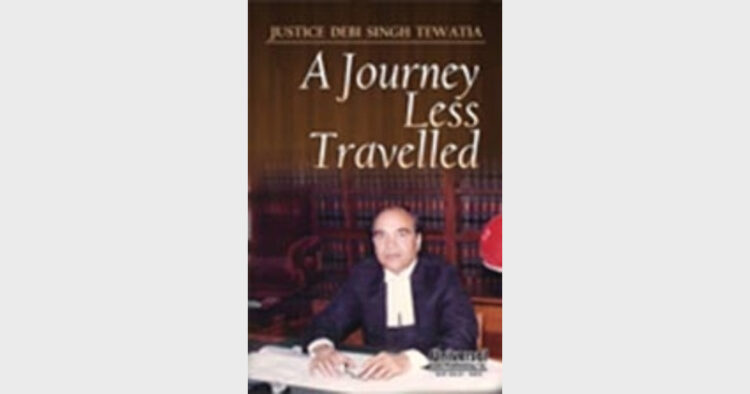Life and times of Dabi Singh Tewatia
First Indian Barrister and Advocate General
A Journey Less Travelled, Justice Debi Singh Tewatia, Universal Law Publishing Co., Pp 394, Rs 650.00
This is an autobiography by Debi Singh Tewatia who later on in life goes on to become the first Barrister-at-Law, first Advocate General, first High Court Judge and the first Chief Justice of High Court from the Jat community, despite his humble birth in a kachcha dilapidated house to an ordinary peasant, Chaudhury Chatur Bhuj of Village Kaundal in Palwal district of Haryana.
The author presents a true picture about himself without camouflaging the fact of his indiscretions like taking to smoking bidi despite knowing that his father would be disappointed and angry with him. He narrates an incident when as a student at the Jat High School at Hodel in Haryana, his friend, who was addicted to smoking, pressurises him to smoke too. The author continues to refuse but one day gets tempted to take one and this way begins his habit of smoking a bidi daily. After some time, the friend stops coming to school and now the author has an overpowering desire to buy a packet.
Narrating another incident from his childhood, the author talks of his friendship with Bhabikshan and how both studied together and slept in each other’s house when they got late at night. One day the author, when sleeping in his friend’s house, sees a glittering bangle lying under his cot. He picks it up and takes it home to give to his mother, who enquires from him for where he had got it. When she learns of his act, she personally goes and returns the bangle to Bhabikshan’s mother while reprimanding her son to never remove anything from anybody’s house without seeking prior permission from the house-owner.
Another amusing incident is about the day when the author notices a torch in the hand of his friend Bhabikshan and wants one too. Since he knows where his mother keeps her purse, he quietly removes a one-rupee coin from it. He goes to the village shopkeeper and buys some sweet. In those days small children in the village did not get any money in hand. So, one of the villagers informs his father about the son spending money in the village market. When the author comes to know that his father knows about his action, he hides himself on a tree in the fields and passes the night on it.
The protagonist talks about his stay in London and his work as a Bar-at-Law and his tenure in service at the Indian High Commission, his rise to the high judicial post and his belief that contrary to what many people believe, he does not support the view that the task of the judiciary is to administer the law as enacted by the law-makers and that their ends their responsibility to the society and the nation. He adds that the concept of justice is not fixed and rigid but a living one which changes, grows and moves in response to the development of the society. His advice to the judiciary is, “Today the concept of symptomatic justice must give way to justice nearest to reality and has to be done in a manner that makes the society and the individual conscious of the desirability of justice informing their every dealing and action and those pave the way for the attainment and building up of a society where economic and political exploitation and social injustice are reduced to their minimum.”
(Universal Law Publishing Co. Pvt Ltd, C-FF-1A Dilkhush Industrial Estate, GT Karnal Road, Delhi-110 033; www.unilawbooks.com)
—MG














Comments